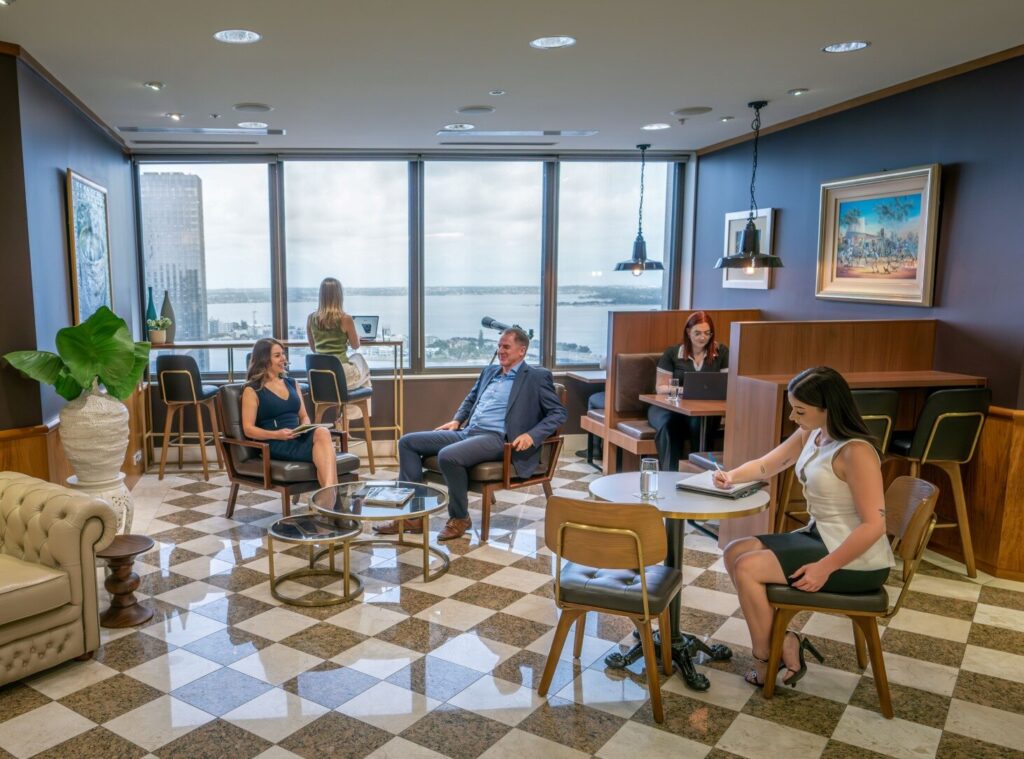Coworking spaces have grown into something much more impactful than flexible office rentals. They’ve become thriving, human-centered environments where professionals feel connected, supported, and motivated. In many ways, the community within a coworking space is what gives it its real value.
For remote workers, freelancers, startup founders, and even established businesses, a strong community is often what makes the difference between a place to work and a place to grow. In contrast to traditional office environments, coworking encourages openness, shared learning, and relationships that extend beyond the workday.
Understanding the Coworking Community
A coworking community is made up of individuals from different industries, backgrounds, and work styles who all share a space with the intention of being productive. These members include digital creatives, solo consultants, remote employees, small teams, and entrepreneurs. While their job titles vary, they all show up with similar goals in mind — to make progress in business, to feel connected, and to be part of a space that encourages both focus and interaction.
Unlike more isolated work settings, coworking culture thrives on chance encounters, relaxed conversations, and the kind of networking that doesn’t feel forced. It’s in these small, daily moments that ideas are exchanged and relationships take root. People working independently begin to feel part of something larger, and such a collective mindset helps define coworking as a powerful alternative to more traditional office setups.
Benefits of a Community-Driven Workspace
In coworking environments, the value of community is visible from the moment you walk in. You might find someone chatting over coffee, two members problem-solving in a lounge, or a newcomer being introduced around by the community manager. These simple interactions often lead to far more meaningful outcomes, from business referrals to long-lasting partnerships.
1. Networking and Referrals
Professional growth happens more naturally when you’re surrounded by people who are open to sharing what they know. Members often exchange tips, tools, and lessons from their own work, and those conversations can shift the direction of a project or spark a new idea entirely. It’s common for members to find mentors or collaborators just by showing up and getting involved.
2. Encouragement and Support
The emotional support offered by a coworking community also cannot be understated. Working remotely or solo can sometimes feel isolating. When you’re part of a space that brings people together, the simple presence of others who understand your challenges makes a big difference. Encouragement flows more freely, and small wins get celebrated. Momentum builds when you’re no longer carrying every task on your own!
Being surrounded by like-minded individuals has a measurable effect on motivation. Days feel more productive, and that steady rhythm helps professionals push through slow periods without losing confidence.
3. Building Social Bonds in Coworking Spaces
Social bonds tend to develop naturally when people spend time together in a relaxed setting. Coworking events help create that space. Whether it’s a lunch gathering, a casual meetup, or a speaker session, members feel more comfortable approaching each other after they’ve shared a moment outside their desks.
Some spaces invite guest speakers to host workshops or Q&A sessions, creating more reasons for people to gather and engage. These events encourage members to learn together and get inspired by different perspectives.
4. Spark Meaningful Connections in Community Spaces
Coworking spaces are designed with interaction in mind. Kitchens, lounges, shared tables, and open-plan work zones give people a chance to cross paths and make casual conversation. These shared areas create moments that lead toconversation and connection.
5. Peer Support and Mentorship
One of the most empowering parts of coworking is how members help each other grow. Peer support becomes a natural part of the coworking experience. Members often exchange advice, provide encouragement, or recommend tools and services that have worked for them.
Mentorship also happens in organic ways. An experienced designer might help a new founder refine their branding. A writer might offer feedback to someone launching a new website. These exchanges help people grow through real conversations. Some spaces have formal mentorship programs, while others foster guidance through organic interaction. Experienced professionals often take time to help others troubleshoot problems or plan next steps, adding to everyone’s personal and professional growth.
6. Accountability and Progress
Members often find that setting goals and staying accountable is easier when someone nearby is checking in. This sense of mutual investment keeps projects moving forward. It helps maintain focus and energy even when motivation dips, creating structure and a sense of momentum that’s hard to maintain when working entirely alone.
From sharing design templates to offering client referrals or vendor recommendations, community members often step in with what they have. This spirit of generosity builds trust and shared success.
Enhancing Work-Life Balance Through Community
Coworking spaces often support balance by offering flexibility and attention to wellness. Members can usually set their own schedules, which allows them to structure their day around work and personal needs.
Wellness as a Priority
Many coworking space owners now include wellness offerings such as yoga sessions, meditation rooms, or even group fitness activities. These programs reflect an awareness that mental and physical health both affect productivity and motivation. Spaces that prioritize wellness often see stronger community member engagement and higher satisfaction, as people feel more aligned with their goals and supported in their health. Whether it’s a mid-morning meditation or a post-work stretch session, these initiatives contribute meaningfully to personal and professional growth.
A Place to Recharge
One of the most unique advantages of working in a coworking community is the emotional support it offers. While private offices allow for quiet, focused work, it’s the shared environment that helps people feel less isolated. Community members notice when someone is having a hard day and often step in with encouragement or a friendly check-in. When members feel cared for by other members, stress becomes easier to manage, and maintaining a healthy work-life balance becomes part of their everyday routine.
The Role of Community in Driving Innovation
Innovation grows when people connect, exchange ideas, and look at challenges from new angles. Within coworking spaces, this dynamic happens frequently. The diversity of skills, backgrounds, and experiences inside these communities creates a fertile ground for new thinking and better solutions.
Coworking members often work in different industries but share a desire to improve, build, and create. When they come together in a shared space, ideas begin to circulate in ways that feel organic rather than forced. These daily conversations, both structured and spontaneous, often serve as the spark for creative breakthroughs.
Networking Opportunities Lead to Ideas
Cross-industry conversations can spark creative solutions. A web developer might offer a marketing insight, or a consultant may help shape a pitch deck. These moments happen naturally in shared environments. Because coworking spaces encourage openness, these exchanges become a regular part of the experience. Members are often willing to offer thoughts, resources, or introductions that support the creative process.
Building Community and Solving Challenges Together
Many coworking spaces run brainstorming sessions, feedback circles, or community-led project groups. These setups help surface new ideas and show how different viewpoints can solve common problems. When challenges are shared among community members, the solutions that follow tend to be more flexible and practical. The input comes from people who understand different aspects of business and creativity, which leads to more well-rounded outcomes.
These shared sessions also help strengthen the bonds between members. Solving problems together builds trust and encourages people to continue helping each other in their day-to-day work.
Building and Sustaining a Coworking Community
Creating community doesn’t happen by accident. When structure meets care, members feel welcomed, supported, and motivated to engage more deeply with their surroundings. Community grows through intentional actions, consistent communication, and leadership that values people as much as productivity. These steps help people feel confident joining conversations and events early on.
Open Communication
Regular newsletters, community boards, and Slack channels keep members in the loop. These platforms also encourage members to share updates, wins, or ideas with others. Communication plays a key role in keeping the community connected. Channels such as Slack or digital notice boards give members the opportunity to share personal wins, post helpful resources, or recommend a guest speaker for an upcoming session. These ongoing interactions help maintain momentum and visibility across the spaces, turning the workplace into a true supportive space for connection and collaboration.
Embracing Coworking as a Community
A solid coworking community turns coworking into a place for connection, creativity, and personal and professional growth. Whether you’re looking for motivation, feedback, or friendship, the right space can make your work more meaningful. As the coworking industry grows, it’s clear that community will remain the cornerstone of every great space.
What is a coworking community?
A coworking community is a group of professionals who share a workspace and connect through conversation, collaboration, and mutual support.
How does community benefit coworking members?
Community builds relationships, creates accountability, encourages learning, and adds meaning to daily work. It helps people feel less isolated and more inspired.
Can introverts thrive in coworking communities?
Yes. Many coworking spaces offer quiet zones, private offices, and optional events that let members control how much they engage.
Are community events mandatory?
No. Participation is entirely voluntary. You can join events when it suits you or focus on work without interruption.
How do coworking spaces build community?
They use shared spaces, curated events, communication tools, and thoughtful onboarding to bring people together.





